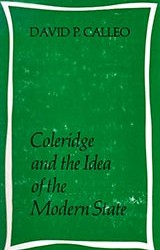The first full length study of Samuel Taylor Coleridge as a political thorist. At once a nationalist, a conservative, and a radical reformer, Coleridge developed an extraordinarily comprehensive and suggestive theory of the modern constitutional state. Here his political ideas are examined in relation to his general philosophy, his Romantic world view, and his psychological insights. Coleridge believed strongly in the vital importance of a political educated in the humanistic tradition; and he was especially interested in a number of problems that concern us today–consensus, psychological identity, and the political role of intellectuals. Mr. Calleo demonstrates the applicability of Coleridge’s thought to present-day issues in a concluding chapter that contrasts his nationalistic theory with modern theories underlying supranational institutions such as the European Economic Community. The book is written to interest those concerned with the history of ideas in England in the nineteenth century, particularly English Romanticism, and is essential reading for students of the development of English Conservatism.
At the beginning of the last century, modern industrialism and the French Revolution presented a tremendous challenge to the political imagination of the Western World. The most humane and successful response was the constitutional nation-state. Today the challenge to creative political thought is hardly less demanding.
Coleridge’s writings furnish an impressive and sophisticated study of the modern national State.
There is, moreover, an admirable spaciousness to his view of politics. His imagination held not only a soaring vision of the whole, but an intense awareness of those untidy details that determine what life is like for the average citizen. It would be surprising if his insights were irrelevant to what we posses at the moment or to what we would like to create in the future.
